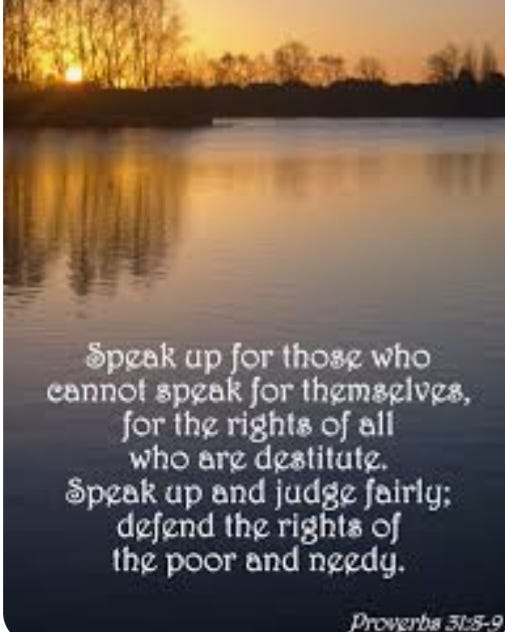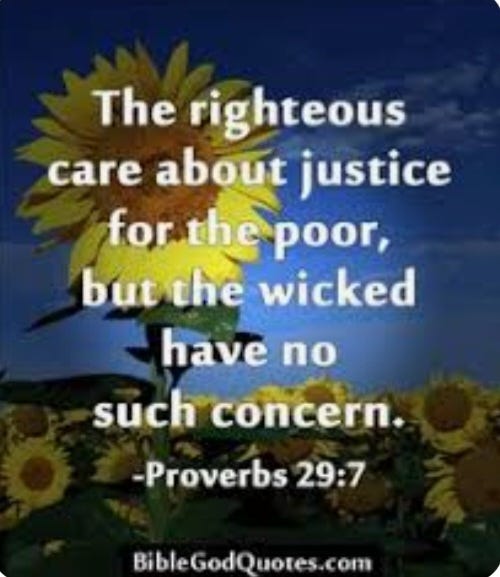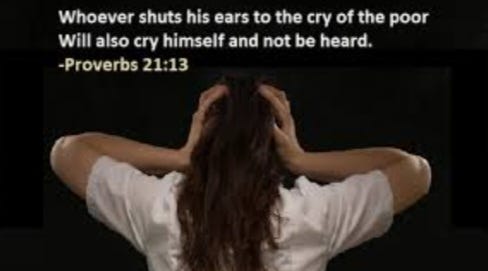So far, we've learned this is most likely Bathsheba, talking to her son, Solomon, whom she calls Lemuel. She urges him to not marry foreign women because they will turn him from God. She also cautions him about alcohol use. She imparts to him the importance of being a just king. In essence, she's being a concerned mom who wants her child to make right choices, king or not.
And that's where we'll pick up this week.
Speak up for those who cannot speak for themselves; ensure justice for those being crushed. Yes, speak up for the poor and helpless, and see that they get justice. Proverbs 31:8, 9 — New Living Translation
Last week, we talked about justice as it pertains to Court proceedings, essentially. Today, we’ll be talking about protecting those who are vulnerable.
Bathsheba is reminding her son that's his job, as king.
For I assisted the poor in their need and the orphans who required help. I helped those without hope, and they blessed me. And I caused the widows’ hearts to sing for joy. Everything I did was honest. Righteousness covered me like a robe, and I wore justice like a turban. I served as eyes for the blind and feet for the lame. I was a father to the poor and assisted strangers who needed help. I broke the jaws of godless oppressors and plucked their victims from their teeth. Job 29:12-17 — New Living Translation
This perfectly sums up King Solomon's job description. Although, this is Job speaking, telling what his life was like before God took everything away to test him.
As a Christian in every day life, we are supposed to be doing this as well! If we claim to love God, then we should be helping those who need help, especially orphans and widows. There are multiple verses in the Bible that specifically speak to this.
In general, churches have turned away from this to concentrating on how many people they can get in their doors and “converted.” Only to leave them without any clue as to what to do next. Not all churches are like this, but it seems to be the norm rather than the exception.
We are to visit the sick and comfort the dying. We're supposed to be just and righteous, but are only known to be ‘holier-than-thou.” Shame on those who have given Christ this name!
We're supposed to be helping those who have been wronged. Yet, we're pointing the fingers at those whose lives are different than ours; even other Christians. We have the audacity to say someone is living their life wrong just because it's different, as if we're God. We're called to help the oppressed. Shame on us!
Disclaimer: Again, I am speaking these things to other Christians. If you don't share my beliefs, I am in no way directing those comments to you. This is me calling out myself as well as my fellow brothers and sisters in Christ. 🙂
Learn to do good. Seek justice. Help the oppressed. Defend the cause of orphans. Fight for the rights of widows. Isaiah 1:17 — New Living Translation
This was actual law that Solomon himself had to follow. Isaiah was reminding people of their God-given duty. These weren't suggestions. They were commands.
This is what the Lord says: Be fair-minded and just. Do what is right! Help those who have been robbed; rescue them from their oppressors. Quit your evil deeds! Do not mistreat foreigners, orphans, and widows. Stop murdering the innocent! Jeremiah 22:3 — New Living Translation
This theme is obviously important to God because He keeps repeating it. And I wonder if He repeats it so much because it isn't being heeded. Sadly, this is still a downfall of Christians today. Come on, Church, rise up!
“And Solomon, my son, learn to know the God of your ancestors intimately. Worship and serve Him with your whole heart and a willing mind. For the Lord sees every heart and knows every plan and thought. If you seek Him, you will find Him. But if you forsake Him, He will reject you forever. 1 Chronicles 28:9 — New Living Translation
Back to Solomon. Not only does his mom have a heart-to-heart with him about his life, his dad, King David, does, too. Here, he’s commissioning his son to do God’s work. Solomon does end up building a temple to God as God instructed him. This was in his earlier days. Then we get to Proverbs 31 when Bathsheba steps in, concerned about his choices. And we know he ended up rebelling against his parents, but more seriously, against God. The last-line warning from his father came true.
“But a beautiful cedar palace does not make a great king! Your father, Josiah, also had plenty to eat and drink. But he was just and right in all his dealings. That is why God blessed him. He gave justice and help to the poor and needy, and everything went well for him. Isn’t that what it means to know Me?” says the Lord. “But you! You have eyes only for greed and dishonesty! You murder the innocent, oppress the poor, and reign ruthlessly.” Jeremiah 22:15-17 — New Living Translation
Here, we meet two new characters, briefly. They are a parallel to King David and his son, King Solomon. This is God talking about King Josiah to his son, King Jehoiakim. Like Solomon, Jehoiakim is not following God's laws, like his father did. It's sort of a pattern with the Israelite kings, but the people begged God for a king, way back when, and He gave them a king. Along the line, some were great, some not so much.
The crux of this passage is reiterating what we’ve been talking about. I’d like to note that needy is listed apart from poor here. They can be two different things. I know that when we hear the word needy, it's usually in conjunction with people who are poor. Or it's used by a mental health professional about someone who is codependent. However, what I think it means is simply one who needs something, physical or not. Maybe it's a depressed person who just needs someone to show they care. Maybe it's a neglected individual who needs a hug or some form of human interaction. Maybe it's a lonely person who simply wants someone to talk to. These aren't examples of human wants; these are basic human needs. It's how we thrive. When we're missing elements, we’re not experiencing our whole selves and can get lost inside our own heads. While God was, and is, concerned with physical needs, such as food, He’s pointing out there's more to being needy than just the physical. In this case, being needy is not used in a negative context.
The godly care about the rights of the poor; the wicked don’t care at all. Proverbs 29:7 — New Living Translation
Pretty succinct instructions for those of us who are Christians.
Either you're godly or you aren't.
Those who shut their ears to the cries of the poor will be ignored in their own time of need. Proverbs 21:13 — New Living Translation
If you're not going to help those who need help, Christians, God will not listen to your cries for help. I don't think it can be much more clear.
This is not to say that helping means you have to do everything yourself. Maybe someone needs baby things because they're expecting, but you don't have the means to get them baby supplies. Helping means you can at least take them to a place that does supply those things. Or putting them in contact with resources they didn’t know about that can better help their situation. Helping means doing something to better their situation by acting on their behalf.
If someone has enough money to live well and sees a brother or sister in need but shows no compassion - how can God's love be in that person? 1 John 3:17 — New Living Translation
Boom! ‘Nough said. God has spoken!
Suppose you see a brother or sister who has no food or clothing, and you say, “Good-bye and have a good day; stay warm and eat well” - but then you don't give that person any food or clothing. What good does that do? James 2:15, 16 — New Living Translation
What good, indeed! How is this a reflection of living out Christian faith every day? This isn't some “only-on-Sundays” lifestyle. This is an every day lifestyle. Or it should be, if you’re aligning yourself with God.
As we can see so far, Proverbs 31 has a lot more to offer than just being a “good, Christian wife”, which isn't what the last 22 verses are about, anyway. We'll start that next week.
With that, I'll close this lengthy communique.
Have a blessed day!







